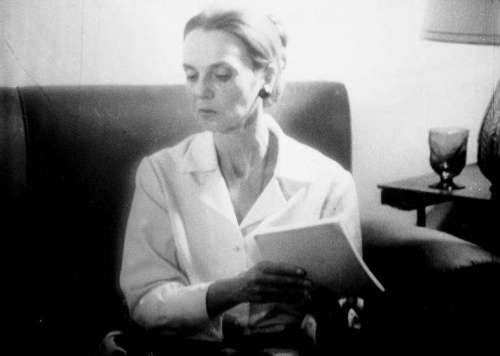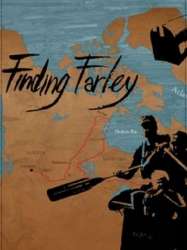Sophia de Mello Breyner Andresen is a portugais film of genre Documentary directed by João César Monteiro
Sophia de Mello Breyner Andresen (1972)

If you like this film, let us know!
Length 17minutes
Directed by João César Monteiro
OriginPortugal
Genres Documentary
Themes Films about writers
Rating68%










Sophia de Mello Breyner Andresen is a black-and-white 1969 Portuguese documentary film by João César Monteiro, then using the name João César Santos, about the notable poet. It was Monteiro's first completed film. It is dedicated to the memory of Carl Theodor Dreyer.
Sophia de Mello Breyner Andresen is part of a series of short-films dedicated to relevant personalities of Portuguese arts and literature produced by the company Cultura Filmes (1967–69) with support from the Gulbenkian Foundation. Monteiro, at the time with no references besides having frequented the London School of Film Technique (1963–65), was recommended to Ricardo Malheiro (1909–77), the owner of Cultura Filmes and himself a director of documentary shorts, by Alberto Seixas Santos and António Pedro Vasconcelos. Initially, Monteiro was developing a project on 19th-century novelist Camilo Castelo Branco to be named Como Filmar Camilo? (How to Film Camilo?). The choice of the Gulbenkian Foundation to confine the series to living personalities made him turn to Sophia.
The work opens with Monteiro reading the credits in voice-over. The poet is filmed among her children in the Algarve during the summer. An important source of inspiration to Sophia herself, the luminous region where Monteiro would shoot Hovering Over the Water (1986) is one of the essential matters of the film. The sea is its dominant element. Sophia de Mello Breyner Andresen ends with the poet writing her name in a sheet that fades to white under the sound of the waves.
Of his own films, Sophia de Mello Breyner Andresen was probably the one more openly discussed by Monteiro. In a self-interview he wrote:
″… I suppose, first of all, that it is the proof for those willing to understand that poetry is not filmable and there is no point in pursuing it. What is filmable is always something else that may or may not have a poetic quality. My film is the realization of this impossibility, and this uncompromising shame makes it, I believe, poetic, malgré-lui. I also believe … that much more than a movie about Sophia, who for me only in a random way is part of it, my film is a film about cinema and its matter.″
^ Paulo Felipe Monteiro, "An Art in the Rough: The Cinema of João César Monteiro", in Lucia Nagib, Anne Jerslev, eds., Impure Cinema: Intermedial and Intercultural Approaches to Film (I.B.Tauris, 2013), ISBN 978-1780765112, p. 152. Excerpts available at Google Books.
^ Monteiro, João César, “Auto-Entrevista”, O Tempo e o Modo, nº 69/70, 1969, in Nicolau, João, ed., João César Monteiro, Lisboa, Cinemateca Portuguesa – Museu do Cinema, 2005.
^ Domingos, Nuno, Audio Interview with JCM, April 1999, in Integral João César Monteiro (DVD collection), Volume I, First Four Films, Lisbon, Madragoa Filmes, 2003.
Comments
Leave comment :
Suggestions of similar film to Sophia de Mello Breyner Andresen
There are 14 films with the same director, 8965 with the same cinematographic genres, 852 films with the same themes, to have finally 70 suggestions of similar films.If you liked Sophia de Mello Breyner Andresen, you will probably like those similar films :

Love Always, Carolyn (2011)
, 1h10Genres Documentary
Themes Films about writers, Documentaire sur une personnalité
Rating63%






Origin Israel
Genres Documentary
Themes Films set in Africa, Films about writers, Films about religion, Documentary films about law, Documentary films about war, Documentary films about historical events, Documentaire sur une personnalité, Documentary films about politics, Documentary films about religion, Political films, Films about Jews and Judaism
Rating65%






Bartleby en coulisses (2009)
, 52minutesOrigin France
Genres Documentary
Themes Films about writers, Documentaire sur une personnalité
Actors Daniel Pennac
At the beginning of 2009, French filmmaker Jérémie Carboni followed French writer Daniel Pennac during rehearsals of Bartleby the scrivener's reading in Pépinière Opéra theatre in Paris.

Corso: The Last Beat (2009)
Genres Documentary
Themes Films about writers, Documentaire sur une personnalité
Rating74%





The Beat Generation’s Gregory Corso became one of four in the inner circle of the Beats, along with Jack Kerouac, Allen Ginsberg, William S. Burroughs. Corso grew up in foster homes, on the streets of Little Italy and Greenwich Village. Corso was sentenced to Clinton State Prison for stealing a $50 suit to go on a date; there, protected by Mafia inmates, Corso read his way through a three-year sentence and ended up at Harvard. He eventually met Allen Ginsberg at a dyke bar in the West Village. After Allen Ginsberg’s death, Corso goes "On the Road" to rediscover his creative Muse. From Paris to Venice, Rome to Athens, Mount Parnassus to Jim Morrison’s grave, Corso reflects on the early days of "Beats." In high humor he reveals how "The Beats" emerged in Europe, and paved the way for youth culture, the sexual revolution and even hip-hop. Corso interrupts his tour to revisit Clinton State Prison and inspire young inmates. Returning to Italy, Corso muses on his lost mother, who he believes is dead and buried in Italy. In a stunning discovery, filmmaker Gustave Reininger finds Corso's mother not dead in Italy, but alive in Trenton, N.J. Corso meets his mother on film and discovers she is the Muse he has been seeking. He also discovers that his mother left him to escape the violence and sexual abuse of his father, who lied saying she had returned to Italy. Healing from a life of abandonment, emotional deprivation and abuse, Corso finishes his road trip on the Acropolis in Greece.A revitalized Corso returns to Greenwich Village, only to discover he is dying. He faces his own death with pluck and humor, comforted by Ethan Hawke, Patti Smith and his newfound mother, Michelina.

Finding Farley (2009)
, 1h2Origin Canada
Genres Documentary
Themes Films about writers, Environmental films, Seafaring films, Sports films, Transport films, Documentary films about sports, Documentary films about environmental issues, Documentaire sur une personnalité, Documentary films about technology, Documentary films about nature
Rating74%






Reporter (2009)
Genres Documentary
Themes Films about writers, Films about journalists, Documentaire sur une personnalité
Actors Mia Farrow
Rating71%






And Everything Is Going Fine (2010)
, 1h29Directed by Steven Soderbergh
Origin USA
Genres Drama, Documentary
Themes Films about writers, Documentaire sur une personnalité
Actors Spalding Gray
Rating70%






Escapade romaine (2010)
, 15minutesOrigin France
Genres Documentary
Themes Films about writers, Documentaire sur une personnalité
Actors Daniel Pennac
French filmmaker Jérémie Carboni followed French writer Daniel Pennac during rehearsals of Bartleby the scrivener's reading in Pépinière Opéra theatre in Paris. This video describes Daniel Pennac's performance in Rome, during the tour.

Patti Smith: Dream of Life (2008)
, 1h49Origin USA
Genres Documentary, Musical
Themes Films about writers, Films about music and musicians, Documentary films about music and musicians, Documentaire sur une personnalité, Musical films
Actors Michael Peter Balzary, Philip Glass, Lenny Kaye, Sam Shepard, Michael Stipe, Bob Dylan
Rating69%





Le film nous révèle la personnalité complexe et charismatique de la "marraine du punk" qui s'est imposée dans les années 70 grâce à son style poétique et à ses textes enragés. Entre interviews, concerts, peinture et photographies, Dream of Life explore onze années de la vie de l'artiste. Pour cette icône du rock, qui commente le film en voix-off, l'existence peut se définir comme une redoutable contradiction.

In the Wake of the Flood (2010)
Origin Canada
Genres Documentary
Themes Films about writers, Documentaire sur une personnalité
Rating65%





 Connection
Connection